Finding other ways to say “Mother” can help you express your feelings with more warmth, care, and individuality. Whether you’re writing a message, preparing a speech, or simply looking for a more heartfelt word, choosing the right expression can make your words sound more personal and deeply emotional. The word “Mother” represents love, guidance, and protection, but using different terms can help capture the unique bond you share and make your message sound more genuine and heartfelt.
What Does “Mother” Mean?
The word “Mother” refers to a woman who gives birth to, raises, or cares for a child. However, its meaning extends far beyond biology — it also embodies unconditional love, selflessness, compassion, and emotional strength. A mother is often seen as a nurturer, a protector, and a guiding light in one’s life. She symbolizes warmth, patience, and endless support. Using alternative terms for “Mother” can help reflect different tones — from tender and emotional to formal or cultural — making your message feel more thoughtful and meaningful.
Is It Professional or Polite to Say “Mother”?
Yes, saying “Mother” is both professional and polite, especially in formal writing, introductions, and respectful mentions. It is a classic and universally accepted term that shows dignity and respect. However, in informal or emotional contexts, using alternatives like “Mom,” “Mama,” or “Mommy” may sound warmer and more affectionate. Choosing the right version depends on your relationship, the setting, and the tone you want to convey. For instance, in a heartfelt letter, “Mom” may feel more personal, while in a speech or essay, “Mother” conveys respect and grace.
Synonyms for “Mother”
- Mom
- Mama
- Mum
- Mommy
- Ma
- Momma
- Matriarch
- Caregiver
- Guardian
- Momsy
- Matron
- Supermom
- Life-Giver
- Queen
- Angel
- Nurturer
- Heroine
- Beloved Mother
- Mama Bear
- Wonder Woman
1. Mom
Meaning: A casual and affectionate word for “Mother” used in daily conversations to express closeness and love.
Tone: Warm, informal, and emotionally connected.
Explanation: The word “Mom” feels homely and personal, often used when you have a close and loving relationship with your mother. It carries comfort and warmth, showing familiarity and affection in everyday speech.
Scenario: You use “Mom” when talking directly to your mother or sharing stories about her in a casual or heartfelt tone.
Examples:
- I called my Mom to tell her about my new job.
- My Mom makes the best homemade food ever.
- I can always count on my Mom for good advice.
- My Mom taught me how to be kind and strong.
- Every time I visit home, my Mom gives me the warmest hug.
2. Mama
Meaning: A tender, affectionate word often used by children or in emotional moments.
Tone: Soft, intimate, and loving.
Explanation: The word “Mama” feels deeply emotional and is often used in family-oriented or nostalgic settings. It conveys sweetness and childlike love, often evoking deep memories of care and protection.
Scenario: You might use “Mama” when expressing love in an emotional message, song, or poem.
Examples:
- I miss my Mama’s gentle voice when I’m far from home.
- Mama always knew how to make me smile.
- Every hug from Mama feels like pure comfort.
- I’ll never forget the lessons my Mama taught me.
- Mama, thank you for believing in me even when I doubted myself.
3. Mum
Meaning: The British and Australian version of “Mom,” equally warm and respectful.
Tone: Endearing and conversational.
Explanation: “Mum” reflects the same closeness as “Mom” but carries a British cultural touch. It is perfect for expressing love in a slightly refined yet heartfelt way.
Scenario: Used commonly in British English-speaking regions or when addressing your mother with warmth and familiarity.
Examples:
- My Mum always supports my dreams.
- I’m grateful for everything my Mum has done for me.
- Mum never forgets my birthday.
- I can talk to my Mum about anything.
- Mum, you’re my greatest inspiration.
4. Mommy
Meaning: A very affectionate and childlike word that expresses pure love and dependence.
Tone: Innocent, tender, and emotionally rich.
Explanation: “Mommy” is often used by younger children but also appears in emotional or sentimental conversations between adults and their mothers. It conveys deep affection and vulnerability.
Scenario: Used when expressing gratitude or emotional memories about your mother.
Examples:
- I’ll always be my Mommy’s little kid at heart.
- Mommy, I miss your comforting words.
- My Mommy used to sing me to sleep every night.
- Mommy, you mean the world to me.
- I still call her Mommy because she’s my comfort zone.
5. Ma
Meaning: A short, simple, and loving version of “Mother” used in many cultures.
Tone: Familiar, warm, and informal.
Explanation: “Ma” feels natural and affectionate, often heard in rural or family-centered conversations. It’s short yet carries strong emotional depth.
Scenario: Used when expressing affection in simple, heartfelt moments.
Examples:
- Ma, dinner’s ready!
- My Ma works so hard every single day.
- Ma always says, “Be kind to everyone.”
- I love visiting my Ma on weekends.
- Ma, you’ve been my biggest blessing.
6. Momma
Meaning: A blend of “Mom” and “Mama,” often expressing deep emotional closeness.
Tone: Comforting, emotional, and heartfelt.
Explanation: “Momma” has a soft, soulful tone often used in emotional writing, songs, or heartfelt conversations. It shows endearment and comfort.
Scenario: Used in family talks, emotional moments, or nostalgic storytelling.
Examples:
- My Momma raised me to be strong and kind.
- I miss my Momma’s laughter.
- Momma always knew how to fix everything.
- There’s nothing like Momma’s cooking.
- Momma, I’ll make you proud.
7. Matriarch
Meaning: The female head or leader of a family or group.
Tone: Respectful, dignified, and formal.
Explanation: “Matriarch” emphasizes authority, respect, and strength. It’s used when referring to a mother who holds the family together with wisdom and leadership.
Scenario: Used in speeches, essays, or formal descriptions.
Examples:
- My grandmother is the matriarch of our family.
- The matriarch guided her children with wisdom.
- Every matriarch deserves recognition for her sacrifices.
- She’s not just a mother but a matriarch in her community.
- Our matriarch keeps family traditions alive.
8. Caregiver
Meaning: Someone who provides care, love, and emotional support.
Tone: Compassionate and thoughtful.
Explanation: The word “Caregiver” highlights nurturing and dedication rather than biological connection. It’s perfect for situations involving stepmothers, guardians, or adoptive mothers.
Scenario: Used when describing someone who takes on the loving role of a mother.
Examples:
- My caregiver has been like a second mother to me.
- A true caregiver gives love without expecting anything in return.
- She became my caregiver when I needed someone most.
- Every caregiver deserves respect for their patience.
- My caregiver made me feel loved and safe.
9. Guardian
Meaning: A protector or someone who takes responsibility for another person’s well-being.
Tone: Strong, respectful, and appreciative.
Explanation: “Guardian” represents the protective and guiding nature of a mother. It emphasizes responsibility and love combined with strength.
Scenario: Used when highlighting the mother’s role as a protector.
Examples:
- My guardian angel on earth is my mother.
- She has always been my guardian and guide.
- Every child needs a guardian like her.
- My guardian kept me safe through every storm.
- I owe everything to my guardian.
10. Momsy
Meaning: A cute and affectionate variation of “Mom,” often used playfully or lovingly.
Tone: Light-hearted, cheerful, and warm.
Explanation: “Momsy” gives a fun, affectionate twist to the traditional “Mom.” It’s often used between children and their mothers or in families with playful communication. This word adds a touch of humor and charm while still showing love and closeness.
Scenario: Use “Momsy” in casual or funny family chats, cards, or texts to express affection with a smile.
Examples:
- My Momsy makes every day brighter with her laughter.
- I love baking cookies with my Momsy on Sundays.
- Momsy, you’re my biggest cheerleader!
- Every time I call her Momsy, she smiles like it’s the first time.
- Momsy, thank you for being my sunshine on cloudy days.
11. Matron
Meaning: A woman who holds a respected, mature, and nurturing position, especially in traditional or formal settings.
Tone: Formal, respectful, and dignified.
Explanation: The word “Matron” conveys wisdom, maturity, and care. It’s used when referring to a woman who manages or guides others with authority and kindness. It’s also used in schools or institutions to describe a motherly caretaker.
Scenario: You might use “Matron” in formal writing or to honor a woman’s leadership and maternal role.
Examples:
- The matron of the house ensured everyone was cared for.
- She carried herself like a true matron of grace and strength.
- The matron guided young women with patience and love.
- Our school matron was like a second mother to everyone.
- Her presence as a matron brought calm to every situation.
12. Supermom
Meaning: A modern expression describing a mother who balances many responsibilities with grace and energy.
Tone: Energetic, admiring, and empowering.
Explanation: “Supermom” celebrates mothers who manage careers, households, and family life without losing their spirit. It symbolizes strength, multitasking ability, and love.
Scenario: Used when praising or acknowledging a mother’s hard work and devotion.
Examples:
- My Supermom can handle anything life throws her way.
- Every Supermom deserves a crown for her endless dedication.
- You’re my Supermom, and I admire everything you do.
- Behind every strong family, there’s a Supermom holding it together.
- She’s not just my mother; she’s my Supermom.
13. Life-Giver
Meaning: A poetic way to describe a mother as the source of life, love, and care.
Tone: Deep, emotional, and poetic.
Explanation: “Life-Giver” emphasizes the miracle and significance of motherhood. It’s a spiritual and respectful term that acknowledges the mother’s role in creating and nurturing life.
Scenario: Used in heartfelt letters, poems, or tributes that express profound gratitude.
Examples:
- My Life-Giver, you brought me into this world with love.
- Every heartbeat I have is thanks to my Life-Giver.
- She is not just my mom; she’s my Life-Giver and protector.
- To my Life-Giver, I owe everything I am.
- A Life-Giver deserves endless gratitude and respect.
14. Queen
Meaning: A symbolic word that portrays a mother as regal, powerful, and deeply respected.
Tone: Empowering, admiring, and affectionate.
Explanation: Calling your mother a “Queen” highlights her strength, grace, and leadership in your life. It’s both playful and meaningful, showing admiration and gratitude.
Scenario: Used to express pride, admiration, and love — especially in messages or social media posts.
Examples:
- My Queen, you rule my heart forever.
- She’s the Queen who raised me with love and courage.
- Every child sees their Queen in their mother’s smile.
- You’ll always be my Queen, no matter how old I get.
- Thank you, Queen, for everything you’ve done for us.
15. Angel
Meaning: A loving term for a mother who feels like a guardian from above.
Tone: Gentle, emotional, and spiritual.
Explanation: “Angel” describes a mother’s kindness, protection, and calming presence. It’s often used when you feel your mother’s love has guided or saved you in difficult times.
Scenario: Perfect for expressing gratitude or emotional memories.
Examples:
- My mother is my Angel in human form.
- Thank you, Angel, for guiding me when I was lost.
- I believe my Angel watches over me every day.
- She may not wear wings, but she’s my Angel.
- Every act of kindness reminds me of my Angel mother.
16. Nurturer
Meaning: Someone who gives emotional and physical care, love, and growth.
Tone: Thoughtful, gentle, and appreciative.
Explanation: “Nurturer” beautifully captures the essence of motherhood — caring, teaching, and guiding others with patience. It’s a powerful way to honor the emotional side of being a mother.
Scenario: Used when describing a mother’s unconditional support and empathy.
Examples:
- She’s a natural nurturer, always putting others first.
- My mom is the best nurturer anyone could ask for.
- Every nurturer deserves love and recognition.
- Her role as a nurturer shaped who I am today.
- The world needs more nurturers like her.
17. Heroine
Meaning: A brave woman admired for her courage and achievements.
Tone: Respectful, strong, and inspiring.
Explanation: “Heroine” portrays a mother as someone who faces challenges with bravery. It reflects admiration for her sacrifices and the strength she shows every day.
Scenario: Used when recognizing your mother’s resilience and dedication.
Examples:
- My mother is the true Heroine of my story.
- Every family has a Heroine who holds it together.
- She fought through hardships like a Heroine.
- To my Heroine, thank you for your endless courage.
- My Heroine taught me how to rise again after every fall.
18. Beloved Mother
Meaning: A formal yet deeply emotional way to refer to one’s mother with affection and respect.
Tone: Respectful, sentimental, and sincere.
Explanation: “Beloved Mother” is timeless and elegant, often used in tributes, speeches, or written dedications. It carries emotional depth and warmth while maintaining grace.
Scenario: Used in heartfelt letters, cards, or memorial writings.
Examples:
- My Beloved Mother, your love shaped my world.
- Every memory with my Beloved Mother feels like a treasure.
- I’ll always cherish my Beloved Mother’s smile.
- My Beloved Mother, you are forever in my heart.
- To my Beloved Mother, thank you for everything.
19. Mama Bear
Meaning: A fun term showing a mother’s fierce protective nature.
Tone: Playful, strong, and loving.
Explanation: “Mama Bear” describes a mother who defends and protects her family with strength and care. It’s both cute and empowering, showing love through protection.
Scenario: Used affectionately in conversation or social media to describe a strong, caring mom.
Examples:
- My Mama Bear always stands up for me.
- Every Mama Bear knows how to protect her cubs.
- I learned courage from my Mama Bear.
- Don’t mess with a Mama Bear and her family!
- My Mama Bear is both gentle and fearless.
20. Wonder Woman
Meaning: A playful yet powerful way to describe a strong, capable, and inspiring mother.
Tone: Admiring, joyful, and empowering.
Explanation: “Wonder Woman” symbolizes a mother who can do it all — love, care, work, and protect. It’s an energetic way to express deep admiration and gratitude.
Scenario: Used when celebrating your mother’s strength and ability to overcome challenges.
Examples:
- My mom is a real-life Wonder Woman.
- Every Wonder Woman deserves endless appreciation.
- My Wonder Woman never gives up, no matter what.
- Behind her gentle smile lies the heart of a Wonder Woman.
- She’s not just my mom — she’s my Wonder Woman.
Conclusion
Choosing other ways to say “Mother” allows you to express love in a way that feels personal and heartfelt. Each alternative carries its own warmth, cultural touch, or emotional tone, helping you connect with your mother in unique and meaningful ways. Whether you call her Mom, Queen, or Angel, the word you choose reflects the bond and gratitude you feel — a love that never fades.
FAQs
1. What is the most affectionate way to say “Mother”?
The most affectionate ways include “Mama,” “Mommy,” and “Momma,” as they express warmth and emotional closeness.
2. Is “Mother” too formal for daily use?
No, “Mother” is timeless and respectful. However, casual alternatives like “Mom” or “Mum” may sound more natural in daily conversations.
3. What are cultural variations of the word “Mother”?
Different cultures use words like “Maa,” “Amma,” “Okaasan,” and “Madre,” showing love in their native languages.
4. What is a poetic way to say “Mother”?
Poetic expressions like “Life-Giver,” “Angel,” or “Queen” beautifully express emotional and symbolic meanings.
5. Can I use these alternatives in writing?
Yes, depending on your tone. Use formal ones like “Beloved Mother” or “Matriarch” in speeches, and informal ones like “Mom” or “Mama” in personal writing.
Amelia Bennett is a language writer at GrammerWay who focuses on English grammar, writing clarity, and common language mistakes. She creates simple, practical guides to help readers write confidently and correctly.
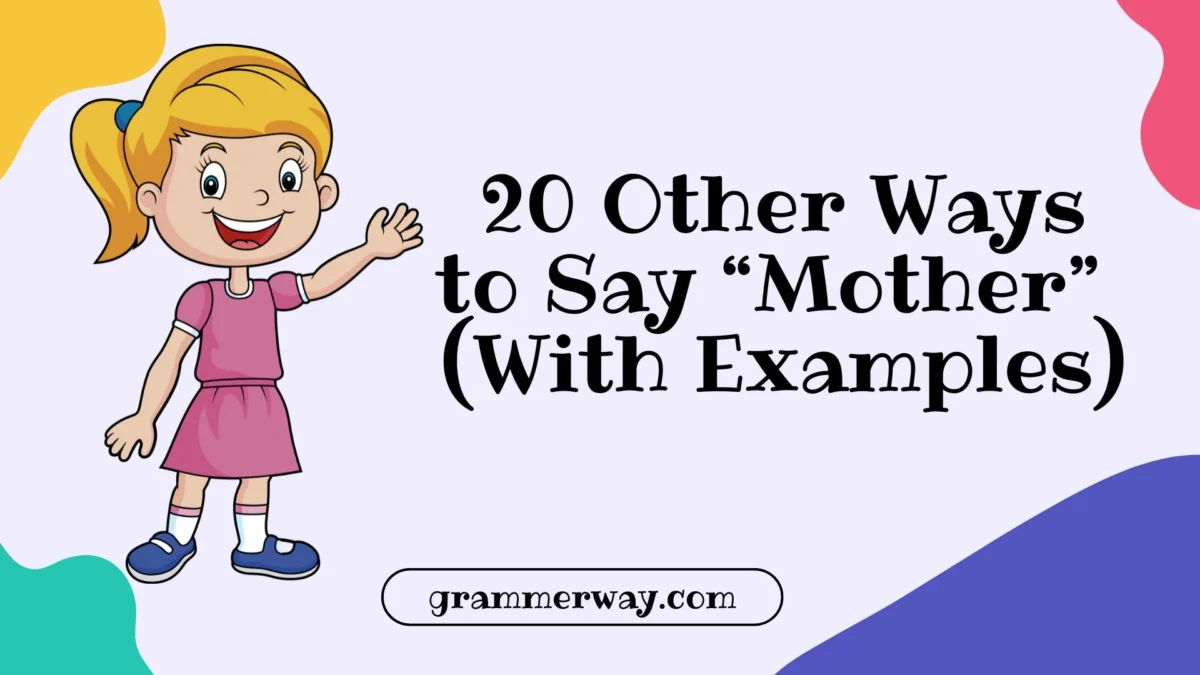
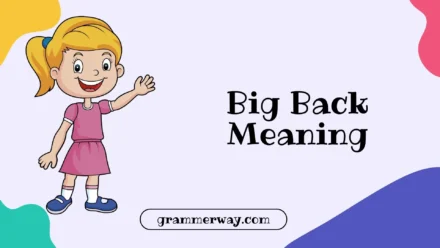
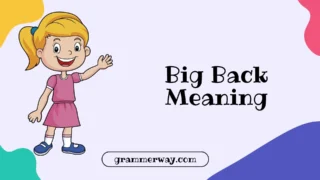


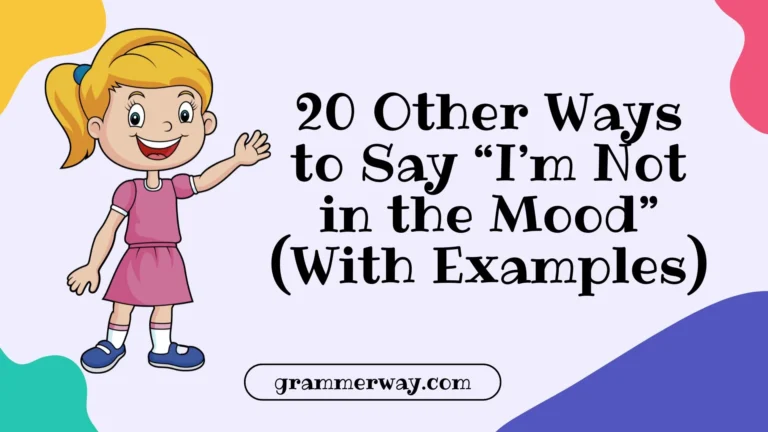
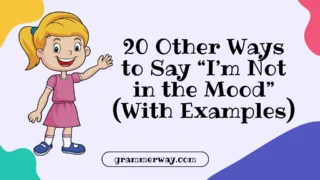
Leave a Comment